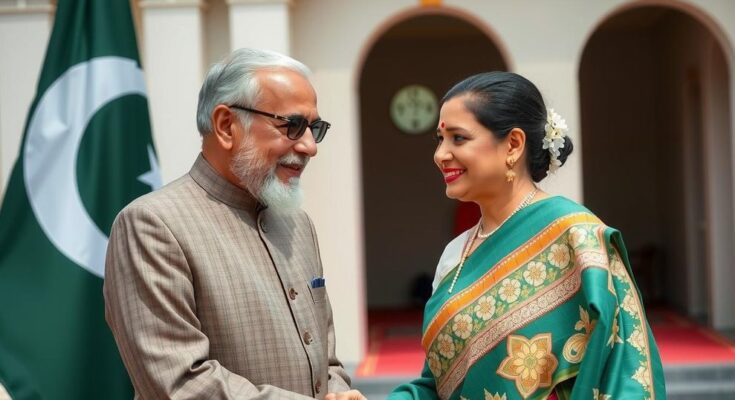Pakistan’s Foreign Minister Ishaq Dar will visit Bangladesh next month, the first such visit in over a decade, following improved relations after the ousting of Prime Minister Sheikh Hasina. Bangladesh’s interim government chief adviser Muhammad Yunus has agreed to visit Islamabad as well. This diplomatic engagement highlights the potential for enhanced cooperation and trade between the nations, marking a shift in their historically strained relationship.
Pakistan’s Foreign Minister Ishaq Dar is scheduled to visit Bangladesh next month, marking the first visit by a Pakistani foreign minister in over a decade. This diplomatic engagement comes in the wake of improved relations following the ousting of Prime Minister Sheikh Hasina in August 2024. Dar’s visit in February, at the invitation of his Bangladeshi counterpart, represents an opportunity for both nations to enhance bilateral ties. Furthermore, Muhammad Yunus, the chief adviser of Bangladesh’s interim government, has accepted an invitation to visit Islamabad.
During the long tenure of Sheikh Hasina, relations between Pakistan and Bangladesh were fraught with tension, primarily due to her alignment with India and the perceived reluctance to mend ties with Pakistan. However, the political landscape has shifted since her departure, leading to significant diplomatic exchanges between the two countries. Reportedly, Bangladesh has lifted restrictions on Pakistani exports, reflecting a resurgence in bilateral trade and the commencement of direct maritime trading between the nations.
At a recent press conference, Minister Dar described Bangladesh as a “brother country,” affirming Pakistan’s commitment to support Dhaka. This collaboration is further underscored by the recent suspension of stringent visa requirements for Pakistani citizens, a policy change that may have implications for regional security dynamics, particularly concerning extremist activities in India’s northeast.
The backdrop of this diplomatic engagement is the evolving political circumstances in Bangladesh, marked by unrest during Hasina’s tenure and the subsequent rise to power of Nobel laureate Muhammad Yunus. His interim government has faced significant challenges, including unrest in the treatment of religious minorities and demands for Hasina’s return, which only exacerbate existing tensions.
This emerging relationship between Dhaka and Islamabad signals a potential thaw in relations, providing both nations with a chance to recalibrate their diplomatic interactions and trade policies after years of strain. The precise impact of these developments on regional geopolitics, particularly in relation to India, remains to be seen.
The upcoming visit of Pakistan’s Foreign Minister to Bangladesh marks a significant moment in the diplomatic history between the two countries, especially as it is the first such visit since 2012. The backdrop of this diplomatic thaw arises from political changes in Bangladesh, particularly following the ousting of Prime Minister Sheikh Hasina, whose long tenure was characterized by close ties with India that often alienated Pakistan. The new interim government under Muhammad Yunus is perceived as more amenable to fostering relations with Islamabad. Notably, trade relations appear to be improving, evidenced by the lifting of restrictions that previously hindered bilateral commerce. The change in Pakistan’s visa policy for Bangladeshi citizens is another sign of warming ties and a shift in the regional political landscape.
In conclusion, the planned visit of Pakistan’s Foreign Minister to Bangladesh represents a critical juncture in the historically fraught relations between the two nations. With trade restrictions being lifted and diplomatic exchanges increasing, this newfound engagement could lead to a more collaborative approach to regional governance and trade. However, the evolving political situation in Bangladesh, particularly regarding the plight of minorities and Hasina’s exile, remains a pivotal factor that both countries must navigate carefully to ensure sustained improvement in bilateral relations.
Original Source: www.business-standard.com




